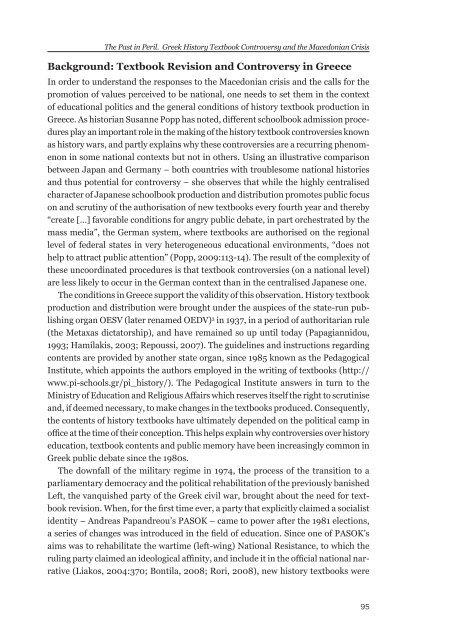Download issue - Umeå universitet
Download issue - Umeå universitet
Download issue - Umeå universitet
You also want an ePaper? Increase the reach of your titles
YUMPU automatically turns print PDFs into web optimized ePapers that Google loves.
The Past in Peril. Greek History Textbook Controversy and the Macedonian Crisis<br />
Background: Textbook Revision and Controversy in Greece<br />
In order to understand the responses to the Macedonian crisis and the calls for the<br />
promotion of values perceived to be national, one needs to set them in the context<br />
of educational politics and the general conditions of history textbook production in<br />
Greece. As historian Susanne Popp has noted, different schoolbook admission procedures<br />
play an important role in the making of the history textbook controversies known<br />
as history wars, and partly explains why these controversies are a recurring phenomenon<br />
in some national contexts but not in others. Using an illustrative comparison<br />
between Japan and Germany – both countries with troublesome national histories<br />
and thus potential for controversy – she observes that while the highly centralised<br />
character of Japanese schoolbook production and distribution promotes public focus<br />
on and scrutiny of the authorisation of new textbooks every fourth year and thereby<br />
“create […] favorable conditions for angry public debate, in part orchestrated by the<br />
mass media”, the German system, where textbooks are authorised on the regional<br />
level of federal states in very heterogeneous educational environments, “does not<br />
help to attract public attention” (Popp, 2009:113-14). The result of the complexity of<br />
these uncoordinated procedures is that textbook controversies (on a national level)<br />
are less likely to occur in the German context than in the centralised Japanese one.<br />
The conditions in Greece support the validity of this observation. History textbook<br />
production and distribution were brought under the auspices of the state-run publishing<br />
organ OESV (later renamed OEDV) 3 in 1937, in a period of authoritarian rule<br />
(the Metaxas dictatorship), and have remained so up until today (Papagiannidou,<br />
1993; Hamilakis, 2003; Repoussi, 2007). The guidelines and instructions regarding<br />
contents are provided by another state organ, since 1985 known as the Pedagogical<br />
Institute, which appoints the authors employed in the writing of textbooks (http://<br />
www.pi-schools.gr/pi_history/). The Pedagogical Institute answers in turn to the<br />
Ministry of Education and Religious Affairs which reserves itself the right to scrutinise<br />
and, if deemed necessary, to make changes in the textbooks produced. Consequently,<br />
the contents of history textbooks have ultimately depended on the political camp in<br />
office at the time of their conception. This helps explain why controversies over history<br />
education, textbook contents and public memory have been increasingly common in<br />
Greek public debate since the 1980s.<br />
The downfall of the military regime in 1974, the process of the transition to a<br />
parliamentary democracy and the political rehabilitation of the previously banished<br />
Left, the vanquished party of the Greek civil war, brought about the need for textbook<br />
revision. When, for the first time ever, a party that explicitly claimed a socialist<br />
identity – Andreas Papandreou’s PASOK – came to power after the 1981 elections,<br />
a series of changes was introduced in the field of education. Since one of PASOK’s<br />
aims was to rehabilitate the wartime (left-wing) National Resistance, to which the<br />
ruling party claimed an ideological affinity, and include it in the official national narrative<br />
(Liakos, 2004:370; Bontila, 2008; Rori, 2008), new history textbooks were<br />
95

















